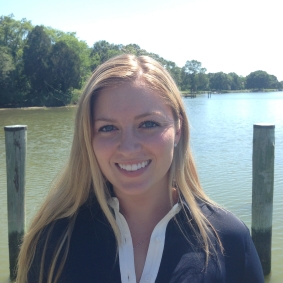Knauss legislative fellowships in Congress help build careers — and they're fun and educational. See our video and fact sheet for details.
Jessica Foley

Fellowship Institution:
NOAA Office of Oceanic and Atmospheric ResearchStart Year:
2015Jessica Foley spent her fellowship year in the Office of Oceanic and Atmospheric Research at the National Oceanic and Atmospheric Administration (NOAA). She served as the special assistant to the office's director and deputy director. There, she worked with members of the leadership on a wide range of national and international science and policy topics. Foley’s work supported NOAA’s mission in three focus areas: oceans and Great Lakes, climate, and weather.
Foley is a master’s student and former Maryland Sea Grant Research Fellow in the Marine Estuarine Environmental Sciences Graduate Program at the University of Maryland. Her research focused on a mathematical model that addresses the growth and health of seagrass communities in the Delmarva Peninsula’s coastal lagoons. Her work could help to illustrate how land use changes and climate change might affect the peninsula's seagrasses, with potential implications for natural resource management decisions.
Before coming to Maryland, Foley earned a dual bachelor’s degree in environmental science and management and Spanish from the University of Rhode Island. She spent time in the Jobos Bay National Estuarine Research Reserve in Puerto Rico where she conducted research for her senior thesis. She also founded a student-run collegiate field hockey program, worked at a wastewater treatment facility, and spent many summers knee-deep in wetlands from bogs to salt marshes and mangroves.
After the Knauss fellowship, Jessica accepted a position working with NOAA's National Ocean Service as a Climate Change and Resilience Coordinator.
Blog Posts
See Jessica's posts to Fellowship Experiences, Maryland Sea Grant's blog written by and about graduate fellows and their work.
"Lost in Translation: Traversing the Boundaries of Science and Policy"
Call for Symposium Presenters and Authors
The Chesapeake Rising: Innovative Law and Policy Solutions for Climate Adaptation in Coastal Communities symposium will explore key legal and policy considerations that affect climate adaptation strategies. It provides a unique opportunity for upper-level law students and early-career lawyers to present and publish their legal scholarship.
Program Announcements
-
-
Maryland Sea Grant has program development funds for start-up efforts, graduate student research, or strategic support for emerging areas of research. Apply here.
News and Blogs
Video Gallery
Sea Grant Film Explores a Diminishing Smithville
Smithville is a community on Maryland’s Eastern Shore, on the edge of the Blackwater National Wildlife Refuge. A century ago, Smithville had more than 100 residents. Today, it has four, in two homes: an elderly couple, and one elderly woman and her son, who cares for her.
Featured Fellow
Featured Research Project
Developing a habitat model for mysids, an important link in Chesapeake Bay food webs
Mysids are important mesozooplankton prey for many species of fish in Chesapeake Bay and are an important link in transferring energy from lower to upper trophic levels. Mysids also serve as biological vectors for benthic-pelagic coupling due to their diel vertical migration and omnivorous prey-switching behavior, which makes mysids important regulators of food web architecture. Despite their central role in coastal food webs, surprisingly little is known about mysid ecology and dynamics in Chesapeake Bay.
The Blue Crab: Callinectes Sapidus
An essential resource for researchers, students, and managers. Get your copy today!


©2025 Maryland Sea Grant. All rights reserved.
5825 University Research Court, Suite 1350 | College Park, MD 20740
Phone: (301) 405-7500 | Fax: (301) 314-5780 | Contact Us



